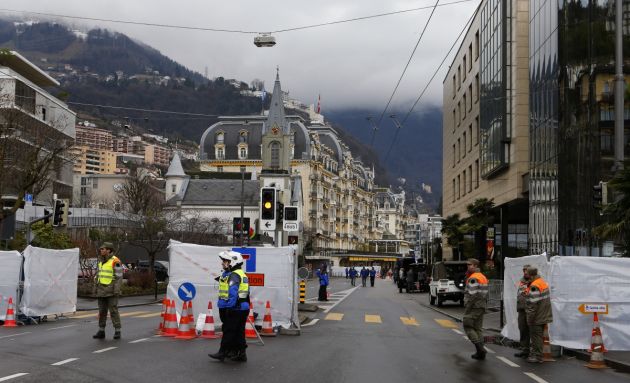Churches call on nations to seize chance for Syria peace at Geneva 2

Montreux is globally known for its annual jazz festival.
But tomorrow, for one day, diplomatic representatives from 31 nations will converge on the town on the banks of Lake Geneva for very serious business - the Geneva 2 talks for peace in Syria.
The talks venue, just over one hour by train from Geneva, are aimed at seeking an end to the bloody conflict.
Fighting started in March 2011 and is believed to have caused the deaths of more than 130,000 people, leaving 9.5 million people displaced.
There is a sectarian element to the conflict involving rival Islamic groups and also minority Christians who get caught in the crossfire or are targeted by extremist Islamists.
In June 2012, officials from the United States and Russia, along with other major powers, met in Geneva and agreed on a road map, known as the Geneva Communique or Geneva 1, for Syria's political transition.
Due to a severe lack of trust that both sides have for one another, people believe it is a wonder that the talks are taking place at all.
The talks have been shrouded in controversy at each step and Iran, a key backer of the regime of Syrian President Bashar al-Assad, had its invitation rescinded Monday when it refused to support a transitional government for the country.
Martin Nesirky, a spokesperson for U.N. leader Ban Ki-moon, said, "The Secretary-General is deeply disappointed by Iranian public statements today that are not at all consistent with that stated commitment.
"He continues to urge Iran to join the global consensus behind the Geneva 1 Communiqué. He has decided that the one-day Montreux gathering will proceed without Iran's participation."
SYRIAN NATIONAL COALITION
The opposition Syrian National Coalition then said it would attend the summit which continues in Geneva on January 24.
When the Geneva 2 talks on Syria begin Wednesday the joint United Nations representative will deliver an urgent peace call from churches all around the world.
A week before the talks scheduled for Montreux, some 30 church leaders from Syria and around the world gathered at the headquarters of the World Council of Churches (WCC) in Geneva.
The church-backed aid agency, ACT Alliance said that the parties to the long-awaited Geneva 2 talks must do everything possible to agree to a ceasefire in Syria, despite the fact it will mean painful concessions on both sides.
When U.N. and Arab League special envoy to Syria, Lakhdar Brahimi, joined church leaders from various Christian denominations in Geneva at last week's meeting organized by ACT Alliance co-founder, the World Council of Churches, the ACT general secretary John Nduna was present.
"Geneva 2 is a unique opportunity to stop fighting," Nduna said after the meeting. "All the parties should step up to this responsibility and accept that they will have to compromise certain positions. If this chance is missed, I am afraid the war may go on for much longer."
ACT Alliance has offered emergency assistance to displaced Syrians and host communities since war began in 2011. Through a $19.9 million appeal, five ACT members provide health care, food, shelter and education to almost half a million Syrians both within the country and in neighboring Jordan and Lebanon, primarily in refugee camps, as well as to communities hosting refugees.
The U.N. estimates that 6.5 million people are internally displaced and a total of 9.3 million need humanitarian assistance, nearly half of whom are children. By 30 November 2013, nearly 2.2 million refugees had been registered in Egypt, Iraq, Jordan, Lebanon and Turkey.
Civilians in Syria suffer severe lack of food, water and access to health and medical facilities at a time when the rate of diseases is rising.
CHURCH OF GREECE
The synod of the (Orthodox) Church of Greece issued an appeal ahead of the talks noting that after almost three since its outbreak the civil war in Syria has claimed the lives of at least 130,000 people "and caused an unprecedented humanitarian crisis."
"We appeal to every organization and agency, on all those in power on earth, to face up to their historical responsibilities to mankind, even at this ultimate moment, and to put an end to this inhuman and absurd 'theatre of death' which has been unfolding in Syria since 2011," said the church statement.
It noted, "The longer international organizations and all parties involved in this tragedy refuse to act in the manner dictated by humanism and reason, the deeper the tragedy in Syria will grow, with unforeseeable implications for the whole of that much-suffering area of the Middle East."
The Geneva-based Conference of European Churches, which represents 114 churches, urged its leaders to pray, and to encourage their political representatives to do all they can to try to secure peace in Syria at the Geneva 2 talks.
Representatives of the largest body of independent experts in the United Nations human rights system called for the Geneva 2 conference to agree on measures to swiftly end the violence.
In an open letter published Tuesday, the United Nations experts also urged a durable peace that has the protection of the human rights at its core.
"The lives, future and fundamental human rights of millions of affected civilians are at stake in Syria," said Chaloka Beyani on behalf the committee which coordinates the work of Special Procedures' experts.
Beyani reminded all parties of their obligations to abide by international human rights and humanitarian law.
"Civilians, regardless of their religion, ethnicity or political affiliation, must be protected by the Government and opposition groups in the areas they control," Beyani noted. "War crimes and crimes against humanity have been documented...perpetrators of such violations must be held accountable."